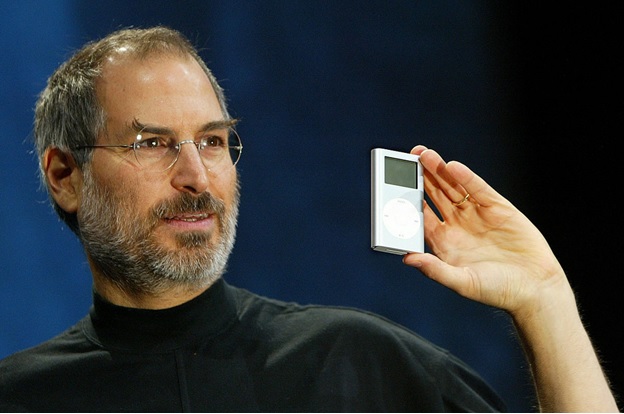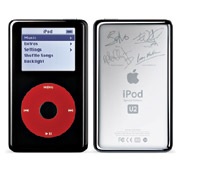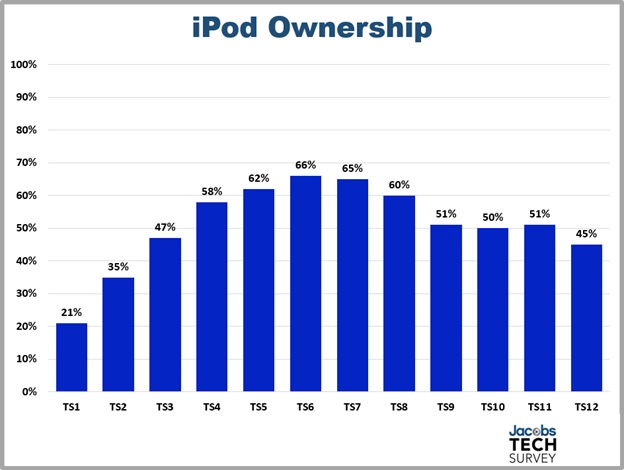
This past weekend, the media and technology world quietly celebrated a milestone. October 23rd marked the 15th anniversary since Steve Jobs unveiled the original iPod. That innovation has had an immeasurable impact on how we have come to perceive, organize, and consume music.
And it has also had a massive impact on radio. In a fascinating article in The Verge, Chaim Gartenburg provides a guided tour, from the original iPod through the various phases: the Mini, Shuffle, Nano, Touch, and the many iterations that followed.
 One of my earliest memories of the iPod’s impact on my life was the release of the U2 Edition in 2004. My son was 13 years-old at the time, and just had to have one.
One of my earliest memories of the iPod’s impact on my life was the release of the U2 Edition in 2004. My son was 13 years-old at the time, and just had to have one.
He also convinced me to buy a little Apple stock for the both of us – shares that I have happily yet to sell. I can tell you that a relatively small investment ended up covering significant college expenses. The iPod was truly a beginning for Apple, and it changed the way entire generations listened to music. From the “shuffle” feature to those “guilty pleasures,” this little device altered music consumption in myriad ways.
For radio, the iPod marked the end – at least for a while – of radio’s portability. The Sony Walkman (and similar devices) were already on the wane when the iPod hit the market. Apple’s innovation essentially finished it off, also ending broadcast radio’s lock on audio you could take anywhere.
But in today’s fast-moving technosophere, trends are more transitory. You can see the trajectory of iPod ownership in our 12 Techsurveys, beginning back in 2005. In the survey’s first year, only about one-fifth of our respondents owned one. In subsequent years, iPod (and mp3 player) growth gained momentum, reaching a peak of 66% penetration in 2010 with TS6, and then sliding down to just 45% in this year’s survey.

Ironically, it was another Apple innovation – the iPhone – that ushered in the decline of the iPod. While many people still own some version of an iPod, more and more now use their smartphones to play their favorite music or their podcasts. And the explosion of streaming music radio channels has changed the audio game, as more and more consumers choose not to own their music.
 For radio, the iPod was an innovation that created disruption. Aside from its culture-shifting impact on portable audio consumption, the iPod took the spotlight away from HD Radio at a time when the radio broadcasting industry strongly supported that initiative.
For radio, the iPod was an innovation that created disruption. Aside from its culture-shifting impact on portable audio consumption, the iPod took the spotlight away from HD Radio at a time when the radio broadcasting industry strongly supported that initiative.
It is fascinating to think that the device that stopped the iPod’s momentum – the iPhone and subsequent smartphones – reopened the door for radio to get its portability mojo back. While broadcasters were not able to participate in the mp3 player boom, mobile apps provided the ability for stations to own prime real estate on the desktops of millions of smartphones. No one carries a radio around with them. But we would be lost without our smartphones.
Today, thousands of radio stations have their own branded apps, a stat that has only grown since Apple opened its App Store more than eight years ago.
So, happy birthday to the iPod, one of the great game-changing inventions of our lifetimes just 15 short years ago. Its rise and subsequent fall is a reminder to all of us how transient success can be in the world of consumer electronics.
Thanks to Mike Stern for the heads-up on this story.
- What To Do If Your Radio Station Goes Through A Midlife Crisis - April 25, 2025
- A 2020 Lesson?It Could All Be Gone In A Flash - April 24, 2025
- How AI Can Give Radio Personalities More…PERSONALITY - April 23, 2025




Leave a Reply